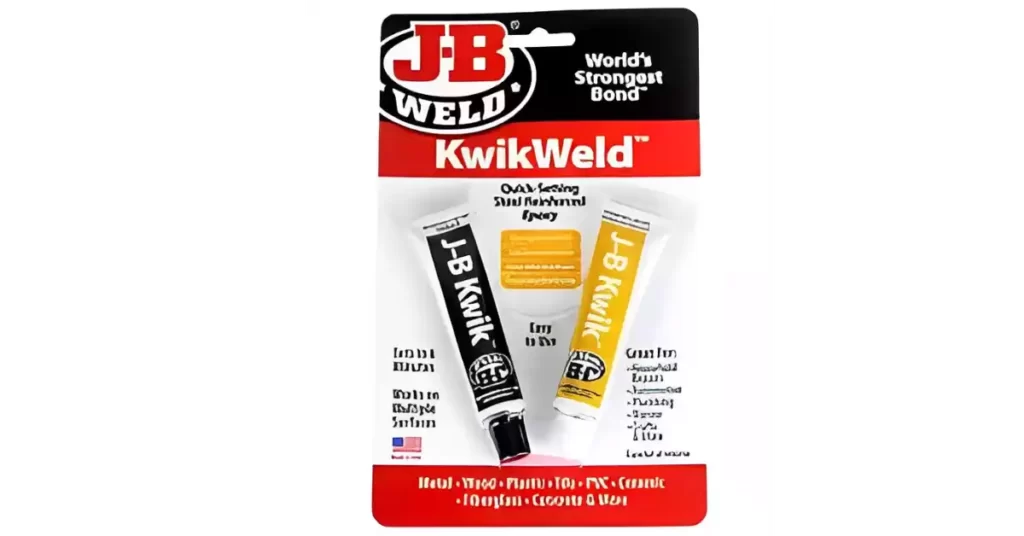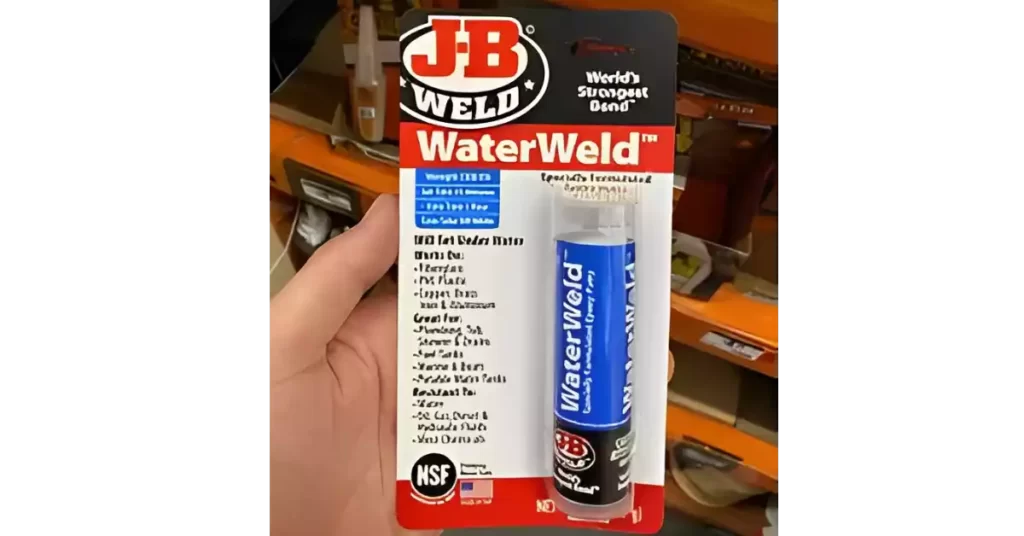Two of the most recognized epoxy resins in the DIY and repair world are JB Kwik and JB Weld. These products, known for their high bonding strength, are often seen as the go-to solutions for a wide range of repair scenarios. From automotive to household fixes, their applications are vast. Yet, a common query that pops up is about their comparative strength – is JB Kwik as strong as JB Weld?
JB Kwik and JB Weld, while sharing the same brand, have different properties that influence their adhesive power. The clear-cut answer to the strength debate is that JB Weld is generally stronger than JB Kwik. This difference lies in their formulations, cure times, and typical applications, all of which we will explore in detail.
This topic goes beyond mere brand comparison. It delves into understanding the nuances of adhesive strength, how different factors like temperature and application can influence it, and ultimately, how to make an informed choice between JB Kwik and JB Weld for your specific needs.
About JB Kwik
JB Kwik, a product of the reputable JB Weld brand, is a fast-setting, two-part epoxy adhesive. It’s particularly known for its quick curing time, taking only about 4 to 6 hours to set and about 4 hours to reach a functional cure. This makes it an ideal choice for quick repairs and projects with tight deadlines.
Typical Applications of JB Kwik
You’ll often find JB Kwik in the toolbox of DIY enthusiasts and professionals alike. It is incredibly versatile, used in a variety of applications where a fast-set solution is necessary. It can effectively bond an array of materials, including metal, plastic, ceramic, wood, and more.
For instance, it’s a popular choice for plumbing repairs, where a quick fix can prevent further water damage. It’s also regularly used for automotive repairs, like fixing a cracked radiator, where it’s vital to get the vehicle back on the road as soon as possible.
Adhesive Strength of JB Kwik
JB Kwik may be fast, but it doesn’t compromise on strength. Once fully cured, this epoxy adhesive can withstand a tensile strength of up to 2424 PSI (Pound-force per Square Inch). While this figure might not match its counterpart, JB Weld, it’s robust enough for most standard applications. So, for day-to-day fixes where high strength is not the primary concern, JB Kwik can be a reliable choice.

About JB Weld
JB Weld is the original product of the JB Weld line, recognized for its dependable and strong adhesive properties. Unlike JB Kwik, it takes longer to cure — around 15 to 24 hours to fully set and about 24 hours to reach a functional cure. However, this extended curing time translates to a stronger bond once dried, making it a suitable choice for heavy-duty applications.
Typical Applications of JB Weld
JB Weld is a go-to epoxy for applications where durability and high strength are paramount. Like JB Kwik, it can bond a wide range of materials, but its true strength lies in its ability to handle demanding conditions.
You’ll find JB Weld being used in high-stress mechanical applications, such as engine block repairs or restoring worn-out tools. It’s also common in outdoor applications exposed to harsh weather conditions, due to its resistance to water, heat, and cold once cured.
Adhesive Strength of JB Weld
JB Weld is a heavy-hitter when it comes to tensile strength. After it has fully cured, it can withstand up to 3960 PSI. This high strength, combined with its temperature resistance (up to 550°F intermittent), makes it an excellent choice for applications requiring maximum durability and strength.

Direct Comparison: JB Kwik vs JB Weld
Now that we have a better understanding of both products, we can delve deeper into their direct comparison.
Breakdown of Key Differences
The most notable difference between JB Kwik and JB Weld is their curing time and the resultant strength. JB Kwik, being a quick-set adhesive, cures faster but provides a lower tensile strength. On the other hand, JB Weld takes a longer time to cure but provides a much stronger bond.
Insights into the Strength Parameter
While the difference in strength might make you lean towards JB Weld, remember that strength isn’t the only factor to consider. Depending on the situation, the quick-set nature of JB Kwik might be more beneficial than the high strength of JB Weld.
Impact of Cure Time on Strength
The different cure times directly impact the strength of the adhesives. A longer cure time, like with JB Weld, allows for stronger chemical bonds to form, resulting in a more robust adhesive.
Practical Experiments and Results
To give a better perspective, let’s talk about real-world tests comparing JB Kwik and JB Weld.
Real-World Tests Comparing the Two
Several DIY enthusiasts and professionals have conducted tests comparing the strength of these adhesives. Most of these tests confirm the manufacturer’s claims — JB Weld often proves stronger than JB Kwik. However, it’s important to note that in many applications, the strength of JB Kwik is more than sufficient.
Expert Opinions on JB Kwik vs JB Weld Strength
Many experts agree that while JB Weld offers more strength, the usability of JB Kwik in rapid repairs can’t be overlooked. It’s about picking the right tool for the job. For less demanding repairs that require quick turnaround, JB Kwik works excellently. For applications demanding high strength and temperature resistance, JB Weld is the better choice.
Factors Influencing the Strength of Adhesives
Several factors can affect the strength of these adhesives.
Temperature and Its Effect
Both JB Kwik and JB Weld can withstand high temperatures once fully cured. However, applying them in very cold or hot conditions can influence their curing process and the resultant bond strength.
Surface Type and Its Role
The type of surface also plays a significant role. Both adhesives bond well to a variety of materials, but their strength can vary depending on the material.
Impact of Proper Mixing and Application
Proper mixing of the two components — the resin and the hardener — is crucial for achieving maximum strength. Additionally, the application process and the condition of the bonding surface (clean and free from oil or dirt) can influence the bond strength.
How to Choose Between JB Kwik and JB Weld
Choosing between these two isn’t about which one is inherently better, but about which one is more suitable for your specific needs.
Considering Application Requirements
Review the demands of the project. Does it require a fast fix, or is the strength of the bond more important? Is it exposed to extreme temperatures?
Assessing Environmental Conditions
Evaluate the environment in which the adhesive will be applied and where it will function. Cold and hot temperatures can affect the curing process and the adhesive’s performance.
Deciding Based on Cure Time
If you can afford to wait for the adhesive to cure to achieve a stronger bond, JB Weld might be the better choice. If you need a quick fix, JB Kwik will serve you well.
Frequently Asked Questions
Can JB Kwik withstand high temperatures?
Yes, JB Kwik can withstand temperatures up to 300°F (149°C) once fully cured. For higher temperature resistance, JB Weld is more suitable, withstanding temperatures up to 550°F (287°C) intermittently.
Is JB Kwik safe for food contact?
No, JB Kwik is not recommended for use on items that come in direct contact with food or potable water.
Can I use JB Weld for quick fixes instead of JB Kwik?
While you can use JB Weld for quick fixes, it will not cure as quickly as JB Kwik. If the repair doesn’t require high strength and needs to be done quickly, JB Kwik is the better choice.
Final Thoughts
Choosing between JB Kwik and JB Weld comes down to evaluating your project needs and understanding each product’s characteristics. Remember, it’s not always about maximum strength but using the right tool for the job.
Though JB Weld might be stronger, JB Kwik’s rapid cure time can be an invaluable asset for quick fixes. Consider the factors we’ve discussed — from application requirements to environmental conditions — and make a choice that fits your specific situation.

